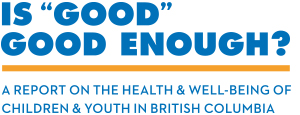Cognitive Development

Cognitive development refers to how children perceive, think about, and gain understanding of their world. Important aspects of cognitive development include the acquisition of age-appropriate reading, writing, and numeracy skills, as well as decision-making, critical-thinking, problem-solving, and self-regulatory learning skills. Another key facet of this dimension is the ability to communicate needs and wants in a socially appropriate manner. From a child’s perspective, learning that engages, interests, excites, inspires, and also prepares him or her for healthy living and meaningful work may be the most important aspects of an effective education.1
Key Findings
Young Children
- Over the past 10 years in BC there has been a decrease in the percentage of kindergarten children who require additional support and care in their language and cognitive development in order to avoid future challenges in school and society. The percentage of children requiring similar support for their communication skills and general knowledge has remained relatively stable. This is generally a success, as it indicates that children are arriving at school more prepared than in the past from a literacy and numeracy perspective; however, there are geographic differences across the province.
- The percentage of kindergarten children who require additional support and care in the area of social competence and emotional maturity has increased. Since mental wellness and illness in later life is rooted in childhood, the increasing vulnerability in social competence and emotional maturity is a concern. There are also geographic differences across the province identified in these data.
Children and Youth
- While the indicators for academic performance have been relatively steady over the years in BC overall, there are clear geographic differences in educational achievement. For example, across several measures (reading and numeracy sections of the Foundation Skills Assessment, and English and Math Provincial Examinations), the results in schools within Vancouver Coastal Health Authority performed substantially better than schools within Northern Health Authority.
- While most of the indicators for academic performance have remained steady over the years, high school completion across BC increased. Among the health authorities, the percentage of students who graduated high school is highest in Fraser Health, followed by Vancouver Coastal Health by a very small margin, while Northern Health had the lowest percentage of students graduating high school, trailing Fraser Health by 18 percentage points.
Explore the Indicators:
#46 Pro-social Behaviour Skills
References
- Canadian Institute for Health Information. Child and youth health and well-being indicators project: CIHI and B.C. PHO joint summary report. Ottawa, ON: Canadian Institute for Health Information; 2013 Feb.
